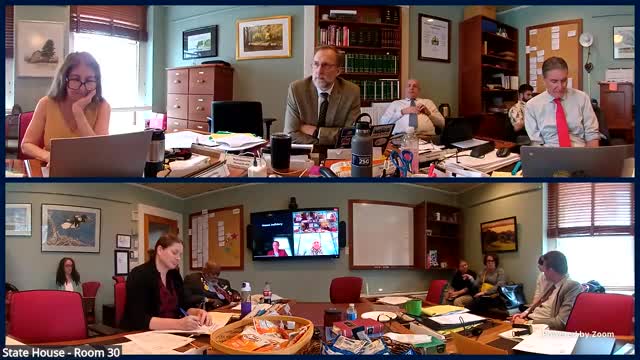Licensing agencies back S.12 but ask courts to notify regulators when records are sealed
Get AI-powered insights, summaries, and transcripts
Subscribe
Summary
Officials from the Office of Professional Regulation and the Vermont Department of Health told the Judiciary Committee they support S.12’s sealing and expungement goals but want statutory language requiring petitioners or courts to notify licensing agencies so regulators can remove sealed records from public databases and avoid disclosure errors.
Jennifer Cohen, general counsel for the Office of Professional Regulation, told the Judiciary Committee that OPR supports S.12 but needs clearer notice and process to comply with sealing and expungement orders.
"S12 is kind of really consistent with maintaining that balance," Cohen said, adding OPR "support[s] S-twelve" and proposed three specific language revisions to the bill to make sure regulatory agencies are notified when a court seals or expunges a record.
Why it matters: licensing agencies said they regularly receive criminal-history information as part of licensing and disciplinary processes and that some information about convictions can appear in publicly accessible disciplinary orders. If courts seal or expunge records, regulators said, they need reliable notice and an explicit mechanism to remove or redact references from public-facing databases so they do not inadvertently disclose sealed material.
What agencies said
Jennifer Cohen described how OPR evaluates criminal histories for roughly 84,000 regulated individual and business licensees across more than 50 professions with about 40 staff. OPR officials said they balance public-protection concerns against individuals' ability to work, often charging underlying conduct rather than listing criminal convictions, and sometimes imposing conditions on licenses rather than outright denial.
Cohen said OPR already removes or redacts records when it receives court sealing orders but that the agency does not consistently receive notice from courts unless OPR or its certified law-enforcement investigators were the arresting or prosecuting agency. She proposed three statutory edits, summarized in committee materials, to do the following: require a stipulation and court order to be sent to entities identified by the petitioner; require courts to send sealing orders to prosecuting and arresting agencies and "any other entity identified by the petitioner that may have a record subject to the sealing order"; and clarify that entities must remove references from publicly accessible databases upon receipt of a sealing order.
"If we're going to take something out of the public view," Cohen said, "we should have a copy of the order so that we can see for ourselves rather than somebody telling us." She added that OPR could not practically accept every sealing order in the state without a mechanism that narrows who must be notified.
Lauren Lehman, general counsel for the Vermont Department of Health, echoed OPR's concerns and said the department also supports the suggested language changes. "We would be able to check, and that would whittle down the numbers sufficiently that the department could handle the volume," Lehman said, describing a process in which courts or petitioners would identify licensing entities that should receive notice.
Melanie Hibbert, deputy secretary of state, told the committee the language in question had not been discussed in the Senate but added her office "strongly support[s]" adding the notice language.
Operational details and constraints
Agencies described practical limits. Cohen said OPR historically had a backlog of about 1,200 enforcement cases that the agency has since cleared; most cases are now adjudicated within about a year. Agencies warned that receiving every sealing order statewide would create heavy administrative and IT burdens and could require additional staff and system upgrades.
Officials explained typical handling of sealed material: investigative files are not public; when a licensing board or administrative law officer disciplines a licensee, orders and supporting pleadings are public and can include references to convictions or docket numbers; when a court issues a sealing order, the agency must redact or remove references from public-facing records and add internal warnings or access controls for any nonpublic records that remain in agency systems.
Committee questions and next steps
Committee members pressed witnesses on whether the burden of notifying agencies should fall to petitioners. Cohen and Lehman said petitioners often know which agencies hold records (for example, because they were participants in disciplinary proceedings) and that adding checkboxes or a short list on the sealing petition could limit the volume of notifications the agencies would receive. Cohen cautioned against requiring agencies to ingest thousands of notices without a way to limit or prioritize them.
The committee chair said staff would incorporate parts of the testimony into bill language and seek additional testimony and drafting from judicial staff and legislative counsel before a future vote.
Ending
Witnesses said they were available for follow-up and for work with judicial staff on petition forms and implementation guidance. The committee scheduled further hearings and possible votes on related matters in coming days.
